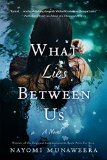Summary | Excerpt | Reading Guide | Reviews | Beyond the Book | Readalikes | Genres & Themes | Author Bio

Yes, I could love her more. I could love her enough to fill up the hole all those brothers and sisters had left by never coming.
* * *
I was born in Sri Lanka, a green island in the midst of the endless Indian Ocean. I grew up in Kandy, the hill city of the Buddhists. A city held high like a gem in the setting of the island. Maha Nuwara, meaning the great city, is the name of Kandy in Sinhala. Or even Kande Ude Rata, the land on top of the mountain. It is the last capital of the Lankan kings before the British came to "domesticate and civilize," to build railroads and scallop the hills into acres of fragrant tea. In their un-sinuous tongue, Kande Ude Rata collapses, folds into itself, and emerges as Kandy. But not candy sweet in the mouth, because this place has a certain history.
In the capital Colombo's National Museum in a dusty glass case lies the sari blouse of one of the last noblewomen of the Kandyan Kingdom. Splotches of faded red stain the moldering fabric of each shoulder. The last Kandyan king was fighting the British when his trusted adviser too turned against him. Enraged, the king summoned his adviser's wife. His men ripped her golden earrings out of her flesh, so she bled down onto this blouse. They beheaded her children and placed the heads into a giant mortar. They gave her a huge pestle, the kind village women use to pound rice, and forced her to smash the heads of her children. Then they tied her to a rock and threw her into Kandy Lake as the king watched in triumph from the balcony of the temple palace. Soon after, the British conquered Kandy and took over the island for centuries.
This is the history of what we do to one another. This is the story of what it means to be both a child of a mother and a child of history.
* * *
The house I grow up in is big and old. It has belonged to my father's family for generations. It has rooms full of ebony furniture, waxed, polished red floors, white latticework that drips from the eaves like lace, and dark wooden steps that lead to my little bedroom upstairs. A wrought-iron balcony hangs outside my window under a tumble of creeping plants. If I stand on its tiny platform just over the red-tiled roof of the first floor, I can see our sweeping emerald lawns leading down to the rushing river. Along the bank a line of massive trees stretches upward toward the monsoon clouds.
* * *
In the living room is a small, slightly moldy taxidermied leopard. There are very much alive dogs in the house, but the leopard is my infant obsession. This is because the leopard lets me ride him, while the dogs do not. Amma says I should call him Bagheera, for Kipling's black leopard, but the name Kaa, for Kipling's Indian rock python, is what I choose. The sound is easier and there is something slithery in his yellow marble eyes. Exactly between these eyes is the neat bullet hole that my father's father put there. The hunting guns are locked away in a chest in my father's study, but the leopard is here as evidence of their presence.
A formal portrait of my grandparents hangs above the leopard. My mustachioed grandfather is in a three-piece suit, my grandmother in a Kandyan osari over a Victorian blouse, ruffled and buttoned against the tropical heat. My father is a boy in short trousers, the only child of the five my grandmother gave birth to to have survived the ravages of malaria.
* * *
The house is a kingdom divided into dominions, inside and outside, and ruled over by the keepers of my childhood, Samson and Sita. In the kitchen, Sita shuffles about in her cotton sari, her feet bare. She has been with my father's family since he was a baby. She and her sister came as young girls. Her sister was my father's ayah, while Sita set up court in this kitchen, which she has never left.
Excerpted from What Lies Between Us by Nayomi Munaweera. Copyright © 2016 by Nayomi Munaweera. Excerpted by permission of St. Martin's Press. All rights reserved. No part of this excerpt may be reproduced or reprinted without permission in writing from the publisher.
Idealism increases in direct proportion to one's distance from the problem.
Click Here to find out who said this, as well as discovering other famous literary quotes!
Your guide toexceptional books
BookBrowse seeks out and recommends the best in contemporary fiction and nonfiction—books that not only engage and entertain but also deepen our understanding of ourselves and the world around us.